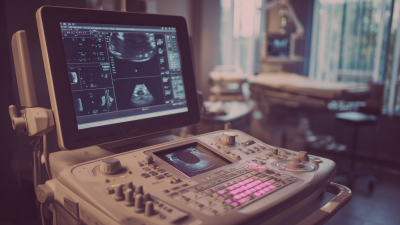10 Essential Medical Supplies You Can't Afford to Overlook for Optimal Healthcare
In today’s healthcare landscape, the importance of having the right medical supplies cannot be underestimated. According to a report by the World Health Organization, effective healthcare delivery relies heavily on the availability of essential medical supplies, which can significantly impact patient outcomes and recovery times. A staggering 40% of healthcare facilities in low- and middle-income countries lack the necessary supplies to provide safe and effective care, leading to increased morbidity and mortality rates. In developed regions, the demand for high-quality medical supplies continues to rise, driven by advancements in technology and a growing emphasis on patient-centered care. This highlights the critical need for healthcare providers and organizations to prioritize and invest in essential medical supplies that not only enhance operational efficiency but also ensure optimal healthcare delivery. In this blog, we will explore ten indispensable medical supplies that should never be overlooked in the quest for superior healthcare.

Top 5 Must-Have Medical Supplies for Home Healthcare Settings
When it comes to home healthcare, having the right medical supplies can make a significant difference in managing health conditions effectively. Among the top must-have supplies, first aid kits stand out as essential. A well-stocked first aid kit should include bandages, antiseptics, gauze pads, and adhesive tape to handle minor injuries promptly. Additionally, keeping a thermometer and a blood pressure monitor can help you keep track of vital signs, ensuring you stay informed about your health status.

Another crucial supply is a reliable set of personal protective equipment (PPE), which includes gloves, masks, and hand sanitizers. These items not only protect the caregiver but also help in preventing the spread of infections, crucial in a home healthcare environment. Additionally, medication organizers can greatly aid in managing prescriptions, ensuring that medications are taken as directed without confusion. By investing in these essential supplies, you can create a safer and more efficient home healthcare setting that prioritizes wellness.
Key Factors to Consider When Choosing Medical Supplies
When selecting medical supplies, it is crucial to focus on factors that ensure quality, safety, and efficiency. One primary consideration is the regulatory compliance of the products. According to a report by the Food and Drug Administration (FDA), over 40% of medical device recalls are due to failures in meeting compliance standards. Therefore, verifying that the supplies meet essential safety regulations can prevent potential risks to patients and healthcare professionals alike.
Another significant factor is the suppliers' reputation and reliability. A recent study published by the Journal of Healthcare Management found that healthcare facilities using trusted suppliers reported a 25% reduction in supply-related errors and adverse events. This underscores the importance of choosing suppliers with a proven track record in quality assurance and customer service. Additionally, evaluating the cost-effectiveness of medical supplies without compromising quality is vital; a survey by Healthcare Purchasing News revealed that 60% of hospital administrators prioritize balancing cost and supply integrity to maintain optimal healthcare delivery.
10 Essential Medical Supplies You Can't Afford to Overlook for Optimal Healthcare
| Medical Supply | Key Features | Considerations | Usage |
|---|---|---|---|
| First Aid Kit | Comprehensive supplies for emergencies | Check expiration dates | Home, office, outdoor activities |
| Blood Pressure Monitor | Digital and easy-to-read display | Calibration and ease of use | Home monitoring of blood pressure |
| Thermometer | Fast and accurate temperature readings | Digital vs. traditional thermometers | Fever monitoring at home |
| Glucose Meter | Tracks blood sugar levels | Test strip availability | Diabetes management |
| Oxygen Concentrator | Provides oxygen as needed | Noise level, portability | Patients with respiratory issues |
| Nebulizer | Administers medication via mist | Ease of cleaning | Asthma or COPD treatment |
| Wheelchair | Comfort and mobility aid | Weight capacity, foldability | Patient mobility |
| Surgical Mask | Protects against airborne pathogens | Breathability and filtration efficiency | Infection control in healthcare settings |
| Hand Sanitizer | Kills germs effectively | Alcohol content and skin sensitivity | Personal hygiene and cleanliness |
Comparative Analysis of Disposable vs. Reusable Medical Supplies
When considering the essential medical supplies for optimal healthcare, the debate between disposable and reusable items is crucial. A significant factor driving this discussion is the increasing pressure on healthcare waste management systems, with the Covid-19 pandemic generating millions of tons of additional medical waste globally. This has raised awareness about the environmental impacts of disposable products. In light of this, the reusable medical equipment market is projected to reach approximately $100.36 billion by 2031, growing at a compound annual growth rate (CAGR) of 18.74%. This highlights a shift towards sustainable practices in healthcare.
On the other hand, the disposable medical supplies market continues to expand, with forecasts indicating a substantial growth trajectory. For instance, the single-use endoscope market is expected to reach $218.63 million by 2033, demonstrating a CAGR of 19.01% during the 2025-2033 period. Despite the rising popularity of disposable supplies due to their convenience and reduced risk of cross-contamination, healthcare providers must weigh these benefits against long-term sustainability concerns and the imperative for effective waste management systems. Ultimately, the choice between disposable and reusable medical supplies involves a complex interplay of efficiency, safety, and environmental responsibility.
Exploring the Best Brands for Essential Medical Equipment
When it comes to ensuring optimal healthcare, the right medical supplies play a crucial role. Selecting the best brands for essential medical equipment can greatly enhance the quality of care in both clinical and home settings. Among the top brands, companies like Medline, Drive Medical, and Philips consistently stand out for their reliability and innovation. Medline offers a wide range of products including surgical supplies and home health care essentials, making them a trusted name among healthcare professionals.
In addition to Medline, Drive Medical specializes in mobility aids such as wheelchairs and walkers, ensuring that patients can maintain their independence and achieve better mobility. Their commitment to quality and user-friendly designs makes them a preferred choice for many caregivers. Meanwhile, Philips is recognized for its advanced health technology solutions, especially in monitoring devices that empower both patients and providers to make informed decisions about health management. Choosing products from these reputable brands not only enhances patient outcomes but also provides peace of mind to those involved in caregiving.
10 Essential Medical Supplies for Optimal Healthcare
Cost-Effectiveness: Investing in Quality Medical Supplies
Investing in quality medical supplies is crucial for optimizing healthcare at home. The UK home healthcare market is projected to grow significantly, from $16.1 billion in 2023 to $26.0 billion by 2030, demonstrating a compound annual growth rate (CAGR) of 7.1%. This growth underscores the increasing recognition of the value of high-quality medical equipment and supplies in enhancing patient care. As telehealth and remote monitoring become more mainstream, families must prioritize acquiring essential supplies that ensure safety and effectiveness.

The integration of AI and IoT in medical devices signifies a transformative approach to healthcare management. For instance, the introduction of smart dashboards that utilize real-time data from equipment is revolutionizing how hospitals operate, enhancing decision-making for healthcare leaders. Such advancements not only improve efficiency but also promote cost-effectiveness in maintaining medical supplies. By investing in top-notch equipment, households can support optimal health outcomes while contributing to a robust healthcare ecosystem that benefits everyone.
Related Posts
-

Mastering the Essentials of Weighing Scale Usage for Accurate Measurements
-

The Ultimate Guide to Choosing the Best Biopsy Punch for Your Laboratory Needs
-

How to Choose the Right External Catheter for Your Needs and Comfort
-

7 Best External Catheters Transforming Male Healthcare in 2023
-

5 Compelling Reasons to Choose Ultrasound Gel for Your Medical Imaging Needs
-

Ultimate Guide to Comparing Medical Crash Carts for Optimal Emergency Preparedness
HEMC (Hospital Equipment Manufacturing Company) was established in the year 1981 and has since been engaged in the export of Medical equipments, Hospital equipments, Orthopaedic Implants & instruments, Laboratory equipments, Scientific & Educational products worldwide. Your support has made us a "Government of India" recognised export house. Our goods have reached all continents from "The Americas" to "Europe" and beyond…